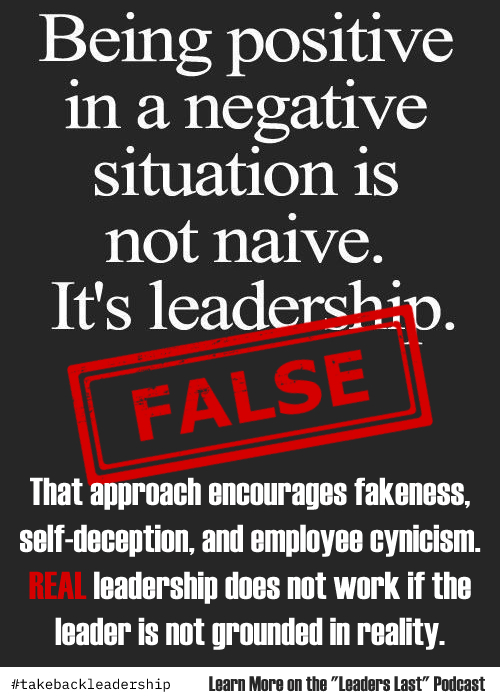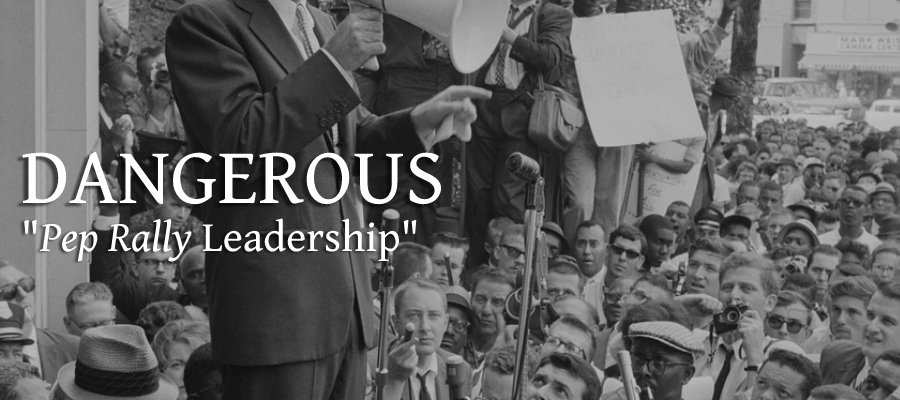Pep Rally Leadership
There seem to be two basic approaches to leadership and its development. There is the “pep rally leadership” approach, and then there is the approach that utilizes the actual science of leadership. Understanding the difference is critical when choosing which road to go down, especially when either individual or organizational investments are on the line and when accurate outcomes matter.
Pep rally leadership is the type of leadership often focused on the short-term goal of boosting morale and feelings and generating enthusiasm among a specific group of people with fancy quotes, witty sayings, and directives that are broad in scope. These are typically the “soft skills” of leadership. While this type of leadership can be effective in a few situations, and while it is also nice to go to a motivational event, this approach can also be dangerous when those sharing the information are not transparent about what little they are sharing.
Pep rally leadership goes by many names and is often associated with misguided leadership. Misguided leadership, also sometimes referred to as pseudo-leadership, is the sharing of false leadership principles and false perceptions of leadership, often by those not versed in the actual science of leadership. Misguided leadership development can lead to a lack of long-term direction, poor decision-making, leadership principles blurred with management principles, and an inability to adapt to changing circumstances when it matters most.
One of the main dangers of pep rally leadership is that it can create a lack of long-term direction. When leaders are only focused on feelings and motivation efforts in the short term, they may neglect to focus on developing or chasing a clear vision and strategy for the future. Moreover, if even a loose idea of vision is had, and if the focus is lacking, effective communication of that vision may also be lacking. This can lead to confusion and uncertainty among followers, who may become demotivated and disengaged over time. Additionally, leaders may struggle to make important decisions and allocate resources without a clear long-term direction. This can lead to a lack of long-term growth and progress.

Another danger of pep rally leadership is that it can lead to poor decision-making. When leaders focus on feelings and motivation over strategy and accuracy, they may be more likely to make emotionally driven decisions rather than logical and data-driven ones. This can lead to poor outcomes and even failure as leaders are less likely to accurately identify the real problem or measure the impacts of their decisions in the long term. Furthermore, leaders may lack the ability to evaluate the situation effectively, leading to decision-making based on the wrong information, which can cause more harm than good.
Furthermore, pep rally leadership can hinder a group or organization’s ability to adapt to changing circumstances. Leaders focused on feelings, boosting morale, and generating enthusiasm may be less likely to identify and effectively respond to potential threats or opportunities. This can make an organization more vulnerable to external factors, such as market changes or customer preference shifts, ultimately leading to failure. The lack of adaptation can also be a huge setback for the organization and lead to losing the competitive edge in the market.
The Scientific Approach
The science of leadership is a broader field of study that examines the principles, theorems, and behaviors associated with effective leadership in various contexts. It is also associated with the long-term professional development of leadership hard skills and the study of leadership through the lens of science. This is where undergraduate, master’s, and doctorate degrees in leadership are rooted. Organizations and individuals can reap numerous benefits by focusing on the science of leadership when it comes to leadership development.
One of the key benefits of focusing on the science of leadership is that it can lead to a better understanding of what truly makes an effective leader. Through research and study, the science of leadership allows individuals to identify the fundamental principles and behaviors associated with effective leadership, such as emotional intelligence, strategic thinking, design strategies, and effective communication. By better understanding what it takes to be an effective leader, individuals can focus on developing the skills most important for their leadership development. Furthermore, by studying the science of leadership, one can develop new skills and understand how to apply the skills in a different context, which can be the key to success in different situations.
Focusing on the science of leadership can also lead to more effective and efficient leadership development. By basing leadership development on evidence-based research, individuals and organizations can avoid relying on unproven or outdated leadership development methods. This can lead to more efficient use of time and resources and more effective outcomes for individuals and organizations. Additionally, by using evidence-based research, leadership development practitioners and organizations can access the latest and most innovative leadership development methods, which can significantly improve the organization’s overall performance and dramatically increase its chances of success. In addition, by using evidence-based research, organizations can be sure that their leadership development program is in line with the latest industry trends and standards, which can help to give them a competitive edge.
Another critical benefit of focusing on the science of leadership is that it offers a more objective approach to leadership development. Through research and data, the science of leadership can provide a more objective view of what makes an effective leader. This can help individuals and organizations avoid relying on personal biases, false perceptions, and subjective opinions regarding leadership development or its expected or actual outcomes. As a result, individuals and organizations can be more confident that the leadership development methods they are using are effective and that the leaders they are developing have the necessary skills and abilities to be successful.
Moreover, the science of leadership also offers flexibility for developing leadership skills. Leadership is a very robust discipline. It allows individuals and organizations to adapt to different contexts and situations using various leadership development methods rather than relying on a single method or style. This can be very beneficial, as different contexts and situations may require different leadership skills and abilities.
While pep rally leadership (soft skills) can be effective in certain situations, it is essential for leaders to also develop other types of leadership skills (hard skills), such as strategic thinking, decision-making, and adaptability (etc.). Misguided leadership development efforts that prioritize pep rally leadership ideals can lead to a lack of long-term direction, poor decision-making, and an inability to adapt to changing circumstances. A well-rounded leader is essential for the success of any organization. Adhering to the science of leadership is a great way to achieve this goal by providing individuals and organizations with a better understanding of what makes an effective leader, a more objective approach to leadership development, and the flexibility to adapt to various contexts.
For more on this, I highly encourage you to read my LinkedIn article, Differences in Leadership Development Programs: The Novice Factor. That said, understand that I am not trying to downplay the importance of mentorship, perspective, experience, and critical self-reflection. Instead, I am merely pointing out the important difference between the perception of leadership and the science of leadership. When results matter, the source of your information likely matters as well.




